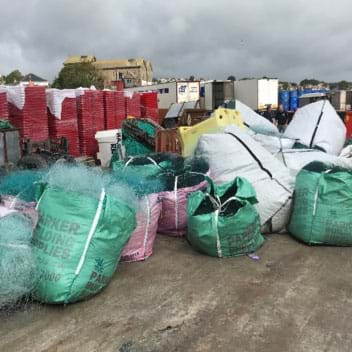Fishy Filaments: Turning end-of-life nets into a raw material for 3D-printing

Fishy Filaments is the brainchild of Ian Falconer, an ex-mining engineer and quarryman, with experience in large-scale material processing technologies and a strong understanding of recycling processes. Ian has lived in Cornwall on and off since he was a child and he has always wanted to do something positive in the area.
With Fishy Filaments he set out to provide a win-win solution for fishing communities and 3D-printer enthusiasts by taking end-of-life fishing gear and transforming it into a commercially viable raw material. This approach removes the costly default disposal charge currently required of the fishing industry. Existing specialist net recycling options are currently all overseas and can result in significant haulage delivery costs. The material they create also helps to reduce the carbon footprint associated with the use of virgin plastics in 3D-printing, a technology which continues to experience rapid growth.
After a year of process development, Fishy Filaments was incorporated in July 2017 and, with support from a crowd-funding campaign, it began transforming collected nets into 3D-printer filaments. Later that year the company was shortlisted for the Plastics Industry Award for Best Recycled Product.
Nylon commercial fishing gillnets have a limited lifespan, lasting no more than 3-6 months of heavy use before they become too worn to repair. Despite mechanical damage sustained through use, the chemical structure of the nylon polymer used to make the gear remains remarkably unchanged - this makes the material ideal for recycling into other products once processed.
Fishy Filaments works closely with Newlyn harbour, the local fishing industry and the South West Fishing For Litter project to collect end-of-life nets and ropes. These are then sorted, graded, shredded and washed (removing salt and bio-fouling), to create clean nylon ‘recyclate’ of a consistently high-quality. The clean nylon is then further processed offsite to make it suitable for use in 3D-printers.
The main product of Fishy Filaments’ recycling process is a dimensionally accurate raw material filament which can be used in Fused Deposition Modelling (FDM) 3D-printing. This process involves passing filaments slowly through a heated nozzle in the 3D-printing machine. The nozzle moves in three dimensions to deposit molten plastic along a computer-controlled pathway, allowing designers to build complex forms that cannot easily be produced by other manufacturing methods.
The adaptability of 3D-printing allows for flexible product design and it can be used to create a range of different products which retain a high mechanical strength and can also be recycled at the end-of-life. Material recycled by Fishy Filaments is currently being used in engineering and leisure applications, point of sale displays and consumer goods, with testing underway with globally known automakers and cosmetics companies. The company also sells its raw material in the form of micro-pellet for use in injection moulding with customers in the drinks industry, events and consumer goods. Applications for the material within the fishing industry are also under active consideration.
Further info
Visit the Fishy Filaments website
Find out more about initiatives tackling marine litter and end-of-life fishing gear